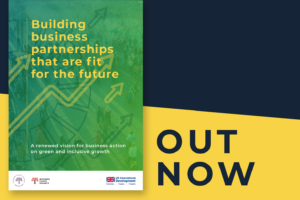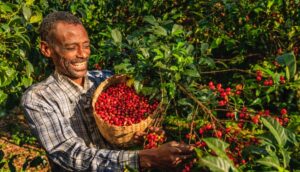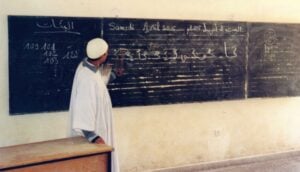By CDC
In West Africa, the name Vlisco evokes heritage, quality and individuality. Established more than 160 years ago, the Vlisco Group’s textiles are at the heart of fashion in West and Central Africa. The company designs, manufactures and distributes 70 million yards of branded fabrics annually through its operations and retail presence in Côte d’Ivoire, Ghana, Togo, Benin, Niger, Mali and the Democratic Republic of Congo. Vlisco also directly employs 2,700 people and it helps to create thousands of additional indirect jobs for salespeople, shopkeepers and tailors. The group’s brands include Vlisco, Woodin, GTP and Uniwax.
In 2010, the company was acquired by Actis, a global private equity firm investing in Africa,Asia and Latin America. Actis’ mantra – the positive power of capital – highlights the firm’s focus on integrating environmental, social and governance factors into all of its investment decisions. Actis has worked closely with Vlisco’s management team to accelerate the development and implementation of the company’s environmental and social strategy. This strategy is driven by Vlisco’s mission – to expand its business and make a greater economic and social impact in African markets.
BUILDING A SUSTAINABLE AND LOCALISED SUPPLY CHAIN
“Over the past few years, we have made an effort to entrench the company in the African reality,” said Jan van der Horst, Director of Corporate Affairs at Vlisco and head of the CSR programme. “We are focused on using local expertise, whether it is in cotton production or marketing. For example, the company now uses a local marketing firm in Côte d’Ivoire, rather than a European firm that operates globally.”
Vlisco’s activities in West Africa, through its two factories in Côte d’Ivoire and Ghana, have generated US$49 million in value added to the local economy and created 19,400 indirect jobs through its supply chain1.
A large part of Vlisco’s shift in strategy has occurred through an increasing focus on the localisation of its supply chains.
West Africa is an important cotton producer and cash crop for small farmers. However, over the past 25 years, what was once a robust industry in cotton spinning and weaving has diminished considerably.Consequently, sourcing cotton locally is a challenge.
Today, about 18 million yards, or 41%, of the fabric for Vlisco’s factories in Ghana and Côte d’Ivoire are sourced in Africa (the remainder is from Asia). Vlisco has reached this milestone through the following projects:
|
Partnership with Cotton Made in Africa(CmiA): |
CmiA’s mission is to help farmers earn a better income by training them in modern and sustainable farming methods that improve the quality and yield of their crops. Unlike many sustainably produced goods that have higher costs, Vlisco purchases cotton from certified farmers in Côte d’Ivoire through Ivoir Coton, at world market prices, which has a positive impact on the local economy, while also keeping Vlisco’s lead times low. Farmers earn approximately 20% more in income as a result of CmiA training. Additionally, CmiA sets labour standards, including ensuring workers’ rights through employment contracts and adequate health and safety practices.(2) |
|
Partnership with cotton supplier in Benin: |
Vlisco has developed an important partnership with CBT, from whom they purchase approximately 12 million yards of cloth. Using a local supplier benefits Vlisco’s operations in two ways: reduced lead times for delivery of cloth to its factories in Côte d’Ivoire and Ghana, as well as lower prices for the cloth. Cotton is one of Benin’s largest export products (17%) and by purchasing from a local supplier, Vlisco adds $7 million in GDP along the supply chain and supports farmers, who represent one of the most vulnerable parts of society. |
|
Developing cotton industry in Ghana: |
Vlisco is engaging with the Government of Ghana to help in the development of its largest cloth producer, by financing the purchase of cotton lint. In addition, Vlisco’s factory in Ghana adds US$11 million in value to the economy annually. |
Vlisco has also been sourcing items for its ready-to-wear collection from small workshops in Côte d’Ivoire and Ghana, which employ 20 to 40 people. The value of this approach to Vlisco is significant because it reinforces its brand promise to offer its customers unique African textiles and products, with a distinct cultural identity. In addition, Vlisco is helping the workshops to meet labour and health and safety standards through a sourcing code of conduct, thus improving the lives of the artisans.
Overall, the socio-economic benefits of building a localised supply chain include:
- Improving the livelihood of small farmers: 3,100 farmers are now engaged in cultivating cotton to meet Vlisco’s demand.
- Creating jobs: 8,600 jobs have been created in Benin, Côte d’Ivoire and Ghana as a result of Vlisco’s cloth sourcing.
- Eliminating the use of child labour: CmiA-certified cotton is not a product of exploitative child labour.
- Decreasing negative environmental impact through sustainable farming methods: CmiA-certified cotton has a smaller ecological footprint as a result of reduced use of pesticides and lower greenhouse gas emissions.
LOOKING AHEAD
With Actis’ support, CSR has established itself in Vlisco’s business principles. “There is a momentum within the company now,” explained Jan.
There is work left to be done. The company’s labour, environmental and local sourcing programmes will continue to develop, as it sets new goals and expands its African footprint.
“There is no question that being active in CSR takes more effort,” said Jan. “It is more work and it requires extra support, but we are gradually winning over hearts. The effort is worth it.”










